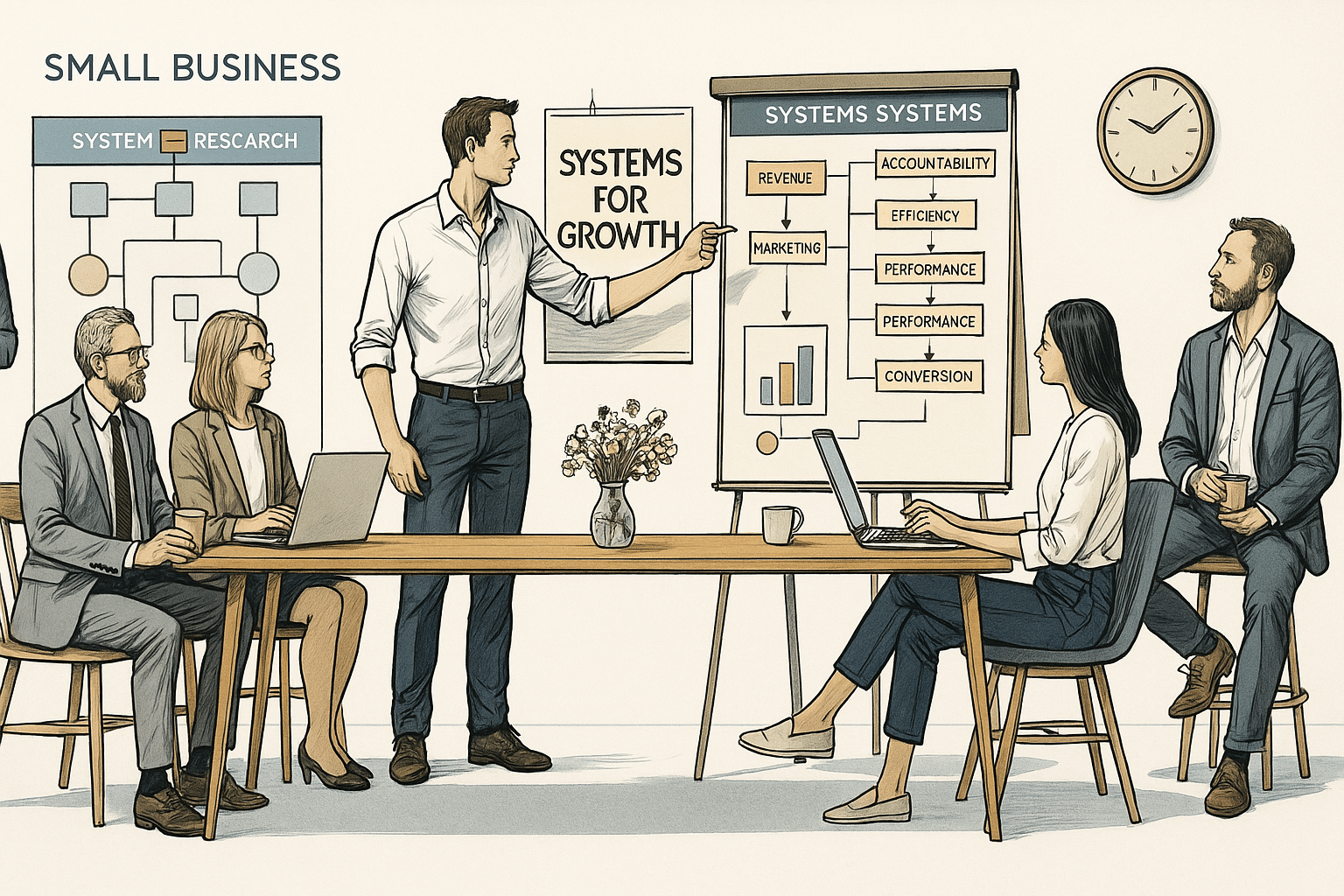Business needs systems for growth might not be the flashiest topic, but if you’re serious about scaling, they’re essential. Many small business owners believe hiring more staff is the key to growing. But here’s the kicker: without systems, more staff usually means more problems.
The Staff Trap: Why People Without Systems Don’t Scale
You’ve built a business, you’re hitting steady turnover, and your team is growing. Great! But now you’re fielding constant questions, fixing mistakes, and jumping in to put out fires. The more people you add, the busier and more stressed you feel.
That’s because people without systems create more work for you not less.
Here’s what happens:
- Staff rely on you for every answer.
- Tasks are done differently depending on who’s doing them.
- Mistakes happen because there’s no standard process.
- You can’t delegate confidently because you’re unsure what’s actually getting done.
The result? You stay stuck in the centre of your business, and growth stalls.
Systems Create Clarity, Consistency, and Confidence
Business systems aren’t just about processes they’re about freedom.
A good system:
- Makes tasks repeatable
- Reduces error
- Sets expectations
- Builds accountability
- Allows staff to operate independently
With systems in place, your team knows exactly what to do and how to do it even when you’re not around.
Common Signs You Need Systems
If you’re not sure whether your business needs systems, ask yourself:
- Are you constantly answering the same questions?
- Do you struggle to take time off without everything falling apart?
- Are new staff taking months to become productive?
- Is the quality of your service or product inconsistent?
If you answered yes to two or more, it’s time to systemise.
What Are Business Systems?
At their simplest, systems are just documented ways of doing things.
They could be:
- Checklists for onboarding a new client
- Templates for quoting jobs
- Step-by-step guides for using your CRM
- Scripts for answering common customer enquiries
- Dashboards to track performance
Don’t overcomplicate it. You’re not writing a corporate manual. You’re capturing your best practices so others can follow them.
The Three Core of Business Needs Systems for Growth
Let’s break down the three categories of systems that drive sustainable growth.
1. Operational Systems
These are your day-to-day processes the engine of your business.
Examples:
- How jobs are booked, confirmed, and scheduled
- How stock is ordered and tracked
- What happens when a customer pays late
These systems ensure work flows smoothly and nothing falls through the cracks.
2. Sales & Marketing Systems
A great product won’t sell itself. Sales systems help you attract and convert leads consistently.
Examples:
- How you respond to web enquiries or phone calls
- Follow-up sequences for leads
- Regular posting schedule for social media or email newsletters
Marketing shouldn’t rely on bursts of motivation it should be part of a repeatable process.
3. People & Culture Systems
Your team is only as strong as the structure behind them.
Examples:
- Onboarding checklists for new hires
- Performance review processes
- Training and upskilling plans
When your team knows what’s expected, how they’re measured, and how they can grow, they thrive.
Real-World Example
I worked with a manufacturing business in South-West Sydney. The owner was swamped, running between quoting, supervising staff, and dealing with suppliers. Turnover was solid, but margins were slipping and staff morale was low.
We didn’t hire anyone new. Instead, we spent six weeks documenting key processes especially around quoting and job handover.
The result?
- Quotes were sent faster with fewer errors
- Staff needed less supervision
- Customers were happier due to improved communication
Turnover remained steady but net profit increased by 18% in the first quarter after implementing the systems. Most importantly, the owner finally took a two-week break without calls every day.
How to Start Building Systems
You don’t need to stop everything and build a system for every part of your business. Start small.
Here’s a simple framework:
Step 1: Pick One Task
Choose something you do often, that someone else could do with guidance.
Example: Sending quotes, chasing invoices, onboarding new clients.
Step 2: Document the Steps
Keep it simple. Use a Google Doc, a checklist, or record a Loom video walking through the process.
Step 3: Test It
Ask a team member to follow the system. Watch what works and what needs fixing.
Step 4: Tweak and Improve
Systems are living documents. As your business grows or changes, so should your systems.
Step 5: Build a Central Hub
Use a tool like Notion, Trello, or even a shared Drive folder to store your systems. Make them easy to find and use.
Overcoming the “I Don’t Have Time” Excuse
One of the biggest objections I hear is: “I don’t have time to build systems.”
But here’s the truth if you don’t make time now, you’ll keep wasting time later. Every undocumented task is a future problem. Every time you answer a question twice, you’re robbing yourself of progress.
Start with one hour a week. Build one system at a time. Within a few months, your business will run smoother, and your stress levels will drop.
Staff + Systems = Real Scale
People are vital but they need structure. When you combine capable staff with strong systems, you get:
- Consistent delivery
- Reduced errors
- Less dependency on the owner
- A business that’s scalable and saleable
If you want to grow, exit, or just get your weekends back systems are non-negotiable.
Let’s Build Systems That Work
At Business Coach Mark, I help owner-operators like you create simple, powerful systems that reduce stress and increase freedom. Whether you’re in construction, professional services, or local trades, the approach is the same: practical, no fluff, and results-focused.
→ Ready to systemise and scale? Book an Initial Chat with Mark today.






